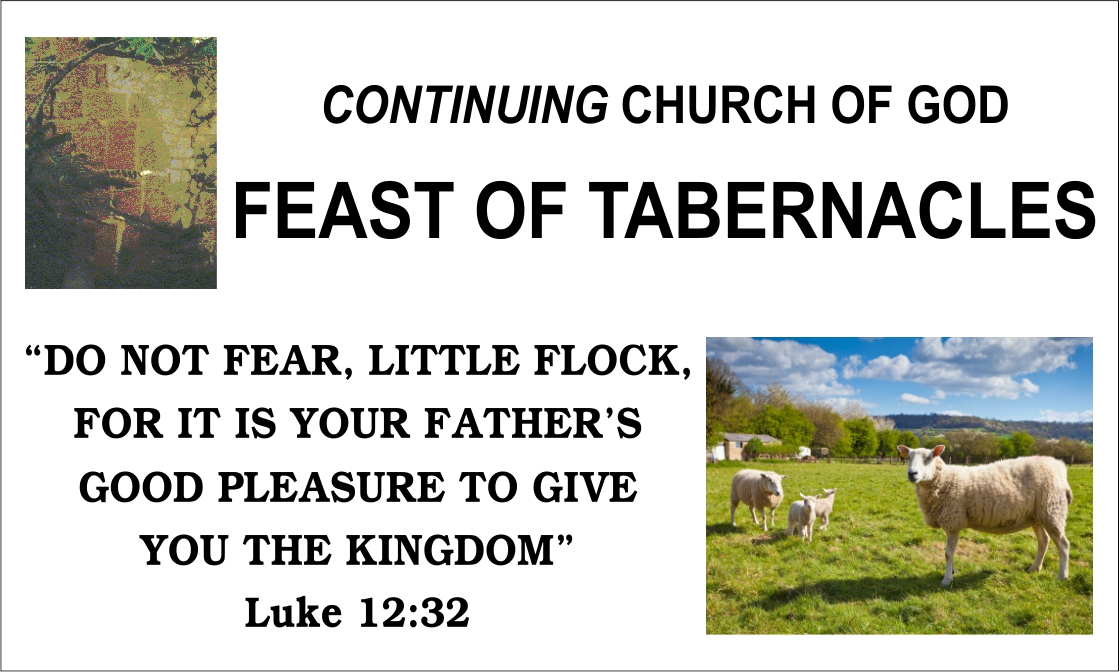Dear Brethren and Co-Workers in Christ:
Greetings from the Five Cities Region of California.
Today is the Day of Atonement and the Feast of Tabernacles is right around the corner.
Atonement in Malawi
The Nelsons arrived in Malawi this week from Minnesota.
They started observing Atonement near Mount Mulanje in Mulanje, Malawi, then went to services in Migowi. Andre Nelson sent the following today:
Hello from Mulanje, Malawi!My Dad, Brother and I traveled to Migowi, Malawi and celebrated the Day of Atonement this morning, my time.During the service, I gave the offertory message and my Father gave the sermon.We had a wonderful time with the Brethren and look forward to spending more time with them as our extensive trip progresses.Kind regards,Andre
The Nelsons expect to also meet many of the brethren from Mozambique for the Feast of Tabernacles.
Feast of Tabernacles

Services for the Feast of Tabernacles are to begin the evening of September 20th and continue until the Last Great Day which is September 28th in 2021.
God commands His people to observe it, so if you have not already done so, please email the appropriate person for the site you want to attend.
Government COVID-blamed regulations have impacted our sites in various ways. Currently, the impact is particularly severe in the Philippines, Australia, India, Mozambique, and New Zealand. Plus, lessor restrictions elsewhere have impacted our plans. Yet, we must obey God. Hence, we still are holding feast sites around the world and have taken steps to better serve those that have been impacted. The USA site has not been impacted by any restrictions we are aware of.
The Feast of Tabernacles, itself, pictures a culminating event in God’s plan. After Jesus died for our sins to redeem humankind, and after He sent us the Holy Spirit and picked out a people for His Name to become kings and priests to reign with Him on earth (Revelation 5:10), and after His Second Coming, and after He has finally placed all the sins upon the head of Satan separating both him and the sins from the presence of God and His people (making us finally joined at-one with Him, atonement), then we are ready for that final series of events, the commencement of the establishment of the millennial Kingdom of God on earth.
The Feast of Tabernacles pictures the spiritual and material abundance that will occur during the millennial reign of Jesus Christ when people will keep God’s laws without Satan’s deceptions (Revelation 20:1-6). This is in contrast to what is happening now in a world deceived by Satan (Revelation 12:9). Satanic deception, which will be gone then (Revelation 20:1-3), is part of why most who profess Christianity have been misled by ‘nice’ false ministers as well as why many of those ministers have been misled (2 Corinthians 11:14-15).
Jesus himself, kept the Feast of Tabernacles and Last Great Day, and also taught it per John 7:10-37.
Here are some instructions about it from the Hebrew scriptures:
33 Then the Lord spoke to Moses, saying, 34 “Speak to the children of Israel, saying: ‘The fifteenth day of this seventh month shall be the Feast of Tabernacles for seven days to the Lord. 35 On the first day there shall be a holy convocation. You shall do no customary work on it.
41 You shall keep it as a feast to the Lord for seven days in the year. It shall be a statute forever in your generations. You shall celebrate it in the seventh month. 42 You shall dwell in booths for seven days. All who are native Israelites shall dwell in booths, (Leviticus 23:33-35,41-42)
13 “You shall observe the Feast of Tabernacles seven days, … 14 And you shall rejoice in your feast, you and your son and your daughter, your male servant and your female servant and the Levite, the stranger and the fatherless and the widow, who are within your gates. 15 Seven days you shall keep a sacred feast to the Lord your God in the place which the Lord chooses, because the Lord your God will bless you in all your produce and in all the work of your hands, so that you surely rejoice.
16 “Three times a year all your males shall appear before the Lord your God in the place which He chooses: at the Feast of Unleavened Bread, at the Feast of Weeks, and at the Feast of Tabernacles; and they shall not appear before the Lord empty-handed. 17 Every man shall give as he is able, according to the blessing of the Lord your God which He has given you. (Deuteronomy 16:13-17)
God had ancient Israel dwell in booths/tabernacles (‘sukkos’ in Hebrew) in the wilderness for decades before they entered the promised land. Those booths, in a sense, pictured that they were only heirs to the promised land. Even during the Millennium, when the Kingdom of God is ruling over mortal nations, the mortal people will be only heirs to the Kingdom. They must overcome and grow in knowledge and wisdom to inherit the promises.
God says of Ephraim (sometimes portraying a type of all Israel in scripture) that they will “dwell in tabernacles, as in the days of the feast” (Hosea 12:9, Douay-Rheims). Israel, in the wilderness, was a type of all people who must go through trials and tribulations to inherit the promises (1 Corinthians 10:11). They were sojourners, waiting to inherit the promises of God.
We Christians are to realize that we have no permanent city in this age and look to the one to come (Hebrews 13:14). The staying in temporary dwellings during the Feast of Tabernacles helps remind us of that. Christians should attend church services, if possible, each day of the Feast of Tabernacles to learn (Deuteronomy 31:10-13; Nehemiah 8:17-18) being living sacrifices, which is our “reasonable service” (Romans 12:1).
The Feast of Tabernacles is a time to rejoice (Deuteronomy 14:26; 16:15). The use of the related tithe (commonly called “second tithe”) shows that this is to be a time of abundance (Deuteronomy 14: 22-26), but also that the ministry should be taken care of in this age (Deuteronomy 14:27). The Feast of Tabernacles helps picture the time of millennial abundance. This gives us a glimpse into the time after Jesus returns.
The millennium represents the seventh day of God’s 7,000 year plan. Interestingly, every seven years, the book of the law was commanded to be read at the Feast of Tabernacles (Deuteronomy 31:10-13). This helps picture that the law, including the Ten Commandments, will be kept in the millennium, as the Bible shows the law will be taught then (Isaiah 2:2-3; more on the commandments can be found in our free online booklet The Ten Commandments). It is living according to God’s laws that will bring blessings and abundance during the millennium.
We Christians now await the coming millennium and the change that occurs at the last trumpet (1 Corinthians 15:52), which is also called the first resurrection:
4 And I saw thrones, and they sat on them, and judgment was committed to them. Then I saw the souls of those who had been beheaded for their witness to Jesus and for the word of God, who had not worshiped the beast or his image, and had not received his mark on their foreheads or on their hands. And they lived and reigned with Christ for a thousand years. (Revelation 20:4)
The Bible show that after Jesus gathers the Church to Himself, and after He is seated on His throne where we will be ruling with Him, He will gather the nations before Him and say to the Christians:
34 Come, you blessed of My Father, inherit the kingdom prepared for you from the foundation of the world: (Matthew 25:34).
Now, those who keep the Feast of Tabernacles look forward to this as it helps picture the millennial kingdom.
In the early second century, Papias of Hierapolis said:
[T]here will be a period of some thousand years after the resurrection of the dead, and that the kingdom of Christ will be set up in material form on this very earth.
The observance of the Feast of Tabernacles is a shadow of the coming millennial kingdom of God that faithful Christians have kept since New Testament times.
The Feast of Tabernacles is essentially a ‘pilgrimage’ (Psalm 84:1-5) period, meaning it usually involves travel outside of one’s normal community. Jesus ‘tabernacled’ with humans when He was here (As the Greek word ἐσκἠνωσεν in John 1:14 can be translated per Green JP. Interlinear Greek-English New Testament. Baker Books, 1996, 5th printing 2002, p. 282).
While some falsely claim that the Feast of Tabernacles from the past through current times must only be kept in Jerusalem, this is in error. The children of Israel were not even in Jerusalem for centuries after the commands for its observance in Leviticus 23 were recorded—hence Jerusalem was not an initial option for them. The Bible shows the Feast of Tabernacles can be kept in cities other than Jerusalem (Nehemiah 8:15; cf. Deuteronomy 14:23-24). During the second temple period (530 B.C – 70 A.D.), Jews often kept it elsewhere (Hayyim Schausse noted, “Sukkos was a great festival even outside of Jerusalem.” Schausse H. The Jewish Festivals: A Guide to Their History and Observance, 1938. Schocken, p. 184).
It may also be of interest to note Polycarp of Smyrna in the 2nd century (Life of Polycarp, Chapter 19.) and certain others in Asia Minor in the late 4th century kept the Feast of Tabernacles in Asia Minor, not Jerusalem. This is confirmed by sources such as the Catholic saint Jerome (Patrologia Latina Volumen MPL025 Ab Columna ad Culumnam 1415 – 1542A) and research done by the 20th century Cardinal Jean Danielou (Danielou, Cardinal Jean-Guenole-Marie. The Theology of Jewish Christianity. Translated by John A. Baker. The Westminister Press, 1964, pp. 343-346).
A nineteenth century anti-millennial scholar named Giovanni Battista Pagani wrote the following about the Egyptian Bishop Nepos of the third century and those who supported the millennium:
…all those who teach a millennium framed according to Jewish ideas, saying that during the millennium, Mosaic law will be restored…These are called Judaical Millenarians, not as being Jews, but as having invented and upheld a millennium according … The principal authors of this error were Nepos, an African Bishop, against whom St. Dionysius wrote his two books on Promises; and Apollinaris, whom St. Epiphanius confound in his work against heresies. (Pagani, Giovanni Battista. Published by Charles Dolman, 1855, pp. 252-253)
It should be of interest to note that neither Bishops Nepos nor Apollinaris were Jews, but were condemned for having a religion that had “Jewish” beliefs. And since Apollinaris is called a Catholic saint, it should be clear that the respected non-Jewish Christian leaders in the early third century clearly did hold to ideas that were condemned by the allegorists. The fact that they held to “Mosaic law” is evidence then that they both understood the meaning of and kept the Feast of Tabernacles, but with a Christian emphasis.
The Greco-Roman bishop & saint Methodius of Olympus in the late 3rd or early 4th century taught that the Feast of Tabernacles was commanded and that it had lessons for Christians:
For since in six days God made the heaven and the earth, and finished the whole world, and rested on the seventh day from all His works which He had made, and blessed the seventh day and sanctified it, so by a figure in the seventh month, when the fruits of the earth have been gathered in, we are commanded to keep the feast to the Lord, …it is commanded that the Feast of our Tabernacles shall be celebrated to the Lord … For like as the Israelites, having left the borders of Egypt, first came to the Tabernacles, and from hence, having again set forth, came into the land of promise, so also do we. For I also, taking my journey, and going forth from the Egypt of this life, came first to the resurrection, which is the true Feast of the Tabernacles, and there having set up my tabernacle, adorned with the fruits of virtue, on the first day of the resurrection, which is the day of judgment, celebrate with Christ the millennium of rest, which is called the seventh day, even the true Sabbath. (Methodius. Banquet of the Ten Virgins, Discourse 9)
The Catholic priest and scholar Jerome said that Nazarene Christians kept it and that they believed that it pointed to the millennial reign of Jesus Christ (Patrologia Latina Volumen MPL025 Ab Columna ad Culumnam 1415 – 1542A). This keeping of the Feast of Tabernacles by Nazarene Christians in the late fourth century was also confirmed by the Catholic and Eastern Orthodox saint Epiphanius of Salamis.
Mainly based upon New Testament scriptures, Christians keep the Feast of Tabernacles a bit different than the Israelites did.
Records indicate that the Feast of Tabernacles seems to have been kept in Europe during the Middle Ages (Ambassador College Correspondence Course, Lesson 51. “And the woman fled into the wilderness, where she hath a place …” Rev. 12:6. 1968) as well as specifically in Transylvania in the 1500s (Liechty, pp. 61-62), at places without palm branches. There is some evidence to suggest that it was kept in the Americas in the 1600 and 1700s. It was kept by the old Radio Church of God and Worldwide Church of God all around the world in the 20th century.
We in the Continuing Church of God continue to keep it in places around the world and we also teach that the Feast of Tabernacles points to the millennial reign of Jesus Christ in the kingdom of God.
The Feast of Tabernacles has been observed by many modern Christians in either tents or motel/hotel rooms functioning as “tabernacles”—temporary dwellings— and not just in palm-branch huts that the Israelites normally used. The New Testament shows that Christians have a different tabernacle (cf. Hebrews 8:2; 9:11-15), which is consistent with not having to personally to build a palm-booth. The Bible shows that the children of Israel dwelt mainly in tents per Exodus 33:8 (and sometimes other apparently temporary, per Deuteronomy 4:45-49, homes) while they were in the wilderness for forty years and that God considered those as “tabernacles” per Leviticus 23:43. Living in tents or motel rooms is a similar type of temporary dwelling/tabernacle today.
The Bible shows Christians need not make animal sacrifices/offerings (Hebrews 9:9) like the burnt offerings which the children of Israel used to provide during the Feast of Tabernacles (Leviticus 23:36-37). Instead, we are to offer ourselves as living sacrifices, which is our reasonable service (Romans 12:1)—which normally includes regularly attending church services during the Feast of Tabernacles.
Some may wonder why attending services is done for all the days at the Feast of Tabernacles, yet this is not required for the Days of Unleavened Bread. The basic scriptural reason is that the command says, ”You shall observe the Feast of Tabernacles seven days … Seven days you shall keep a sacred feast to the Lord your God in the place which the Lord chooses” (Deuteronomy 16:13,15), but that is not so stated related to the Days of Unleavened Bread—the commands for it says to eat unleavened bread for seven days in Leviticus 23:6 and Deuteronomy 16:3, as opposed to observe the feast for seven days (we make a ‘sacrifice’ the seven days of unleavened bread by eating unleavened bread on each of the days). The Bible also says to be in temporary dwellings during the Feast of Tabernacles (Leviticus 23:42), but does not state this related to the other Holy Days.
Since Satan will be bound for the millennial reign (Revelation 20:1-2), there will be less deception then. Going away for the time of the Feast of Tabernacles and meeting daily helps picture a time when the world will be quite different than it now is.
“Your Kingdom Come!” (Matthew 6:10).
Bible prophecy shows that the Feast of Tabernacles will be kept in the millennium:
16 And it shall come to pass that everyone who is left of all the nations which came against Jerusalem shall go up from year to year to worship the King, the LORD of hosts, and to keep the Feast of Tabernacles. 17 And it shall be that whichever of the families of the earth do not come up to Jerusalem to worship the King, the LORD of hosts, on them there will be no rain. 18 If the family of Egypt will not come up and enter in, they shall have no rain; they shall receive the plague with which the LORD strikes the nations who do not come up to keep the Feast of Tabernacles. 19 This shall be the punishment of Egypt and the punishment of all the nations that do not come up to keep the Feast of Tabernacles (Zechariah 14:16-19).
So the Bible teaches that God will expect all to keep the Feast of Tabernacles in the future. Even Roman Catholic commentators recognize that God’s plan includes the Feast of Tabernacles. A Roman Catholic commentary on passages in Zechariah 14 states:
In the meantime such as before persecuted the Church shall be converted, & with great devotion will celebrate the festivities, and exercise religious rites to Gods honor: and shall merit great rewards. (The Original And True Douay Old Testament Of Anno Domini 1610 Volume 2, p. 824)
The kingdom of God will replace all the kingdoms of this world (Revelation 11:15), and this festival helps picture this by separating (cf. Revelation 18:4; 1 John 2:18-19) Christian pilgrims (1 Peter 2:1-12) from their usual routine.
The keeping of the Feast of Tabernacles gives us a glimpse in this age of what will happen in the future millennial kingdom. The Bible also shows that later, “the tabernacle of God” will be on the earth “and He will dwell with” us (Revelation 21:3).
Keeping the Feast of Tabernacles now is a foretaste of things to come in the Kingdom of God.
If at all possible, you need to do that this year.
Here is a listing of CCOG Feast of Tabernacles’ Sites for 2021.
A New Congregation Being Established in Kenya
As mentioned last week, CCOG evangelist Evans Ochieng baptized 38 in Malawi. Here is a photo:
He then boarded a plane to go back to Kenya and sent this photo:
CCOG pastor Tiongik Sawek sent the following report:
Hello, we greet you in the name of Jesus Christ. Last Friday, I received a message from Evangelist Ochieng about his arrival from Malawi. He told me we meet for a sabbath as he pass by and we proposed to meet at Bomet including brethren from Kiramwok. We eventually held a blessed sabbath together being led by Elder Cheruiyot and I was the programmer of the day.After the prayers, we introduced each other, and we had leaders from Mau, Njoro, Molo, Bomet, Chilani and Takitech. Finally we went for lunch in the Brevan hotel, one of the best restaurant hotels in the town. We are glad Evangelist Ochieng managed to host us for lunch.The Evangelist brief us on the Malawi visit, which he described as the best one ever being full of blessings. He also gave us a chance and we gave a report of our continuity in our areas, we are happy the Mau region has grown up currently having three groups, Bomet having two groups, Takitech group and Chilani having four groups with an increased number of brethren.The Evangelist felt happy and appreciated the leaders and finally emphasized on prayers to each other, as the continuity church has grown in Rift valley.Eventually we concluded that the upcoming feast of tabernacles will be held at respective areas being led by the respective leaders.It was further discussed that after the feast of tabernacles, we shall be visiting the areas of Maasai land together with Pastor Cheruiyot as promised earlier.I went ahead and discussed with the Evangelist of a new church to be established at Cheramgoi and he told me to visit the area today.
We are pleased for the growth and opportunities to reach all that we can (cf. Matthew 24:14, 28:19-20).
Suggested Sabbath Day Service
Here is a suggested Sabbath day service for our scattered brethren and other interested people:
- 2-3 hymns (our songbook, The Bible Hymnal, contains the materials from the 1974 Bible Hymnal from the old WCG with new covers, plus ten additional hymns; there is also some Choral Accompaniment online).
- Opening prayer.
- The suggested sermonette is: Woke: Follow the True Science. Other sermonettes are available at our Prophecy channel on BitChute https://www.bitchute.com/channel/prophecy/
- Announcements (if any; though for many it will be this letter) and one hymn.
- The suggested sermon, which for most who receive this letter via email, will be a recorded one. The suggested one is: The Godhead. Other sermons are also available at the COGTube channel on BitChute https://www.bitchute.com/channel/cogtube/
- Final hymn.
- Closing prayer.
Note: If you have a slow internet connection, you can watch these by starting the video, then below it (and towards the right) look for an outline of a gear–if you click on that, it will allow the YouTube video to be played with lower video quality, but at least it will not stop often–you can select a quality as low as 144p. If your internet connection is still too slow (as my home one is) and/or you prefer audio messages to audio-visuals ones, go to the YouTube link for the message, click on SHOW MORE related to the description. You will then see something that says, “Download MP3.” Below that is a link to an MP3 file. Most computers (and even some cellular telephones) will allow MP3 files to be downloaded and played. This is an option we have made available (but we are also looking into ways to improve that as well)–and, of course, we have written article options. Some people have found that if their internet connections are not fast enough, that they can simply listen to the messages that are found at the Bible News Prophecy online radio channel.
IN CASE YOU DO NOT RECEIVE A ‘LETTER TO THE BRETHREN’ FOR ANY WEEK, REMEMBER THAT THERE ARE MANY SERMON MESSAGES ON THE ContinuingCOG channel AND MANY SERMONETTE MESSAGES ON THE Bible News Prophecy channel. There are also some messages at the CCOGAfrica channel. There are also messages in the Spanish language at the CDLIDDSermones channel.
Feast of Tabernacles Services
Those who possibly can should attend Feast of Tabernacles services in person.
Here is a link to the locations of the CCOG Feast of Tabernacles’ Sites for 2021.
Here are some sermons and other messages that were made in 2021 to be watched during the Feast of Tabernacles for those without live speakers:
- Feast of Tabernacles: 2021 Opening Night MessageFeast of Tabernacles Offertory
- Utopia: From Humans or God?
- Behind the Work 2021: Preparing to Instruct Many
Here are some from previous years:
Is World Government the Solution?
Behind the Work 2019: Into All the World
Truth and Lies about the Feast of Tabernacles
The Better Resurrection
Our role in the Kingdom and Persecutions
Here are some sermonettes that you might wish to watched during the Feast of Tabernacles:
- Should you be concerned about the ecumenical movement?
- Book of Remembrance
- Dealing with Satan
- Were the Laws of Traffic Nailed to the Stopsign?
- Dante Aligheri’s Inferno, Heaven, and The Real Hope
- Parable of the Talents: Are there Prophetic Ramifications?
- Satan’s Plan: A Brief Introduction
- Can you see the ‘Handwriting on the Wall’?
- Eating Right, Eating Too Much, and Prophecy
- The Four Horsemen of the Apocalypse
- Zephaniah’s ‘Gather Together’ Prophecy
- Jewish Year 5779 or 5990?
- Millennials, Generation Z, and the Millennium.
If you are a Christian, YOU need to keep the Feast of Tabernacles. For information on how, check out the article: How to Keep God’s Festivals.
World News Items
There are concerns about civil unrest in the USA (see Increased anger in USA: Calls for a civil war?) as well as the ‘fourth reich’ in Austria (see Food pricing to force Americans to get COVID vaxed? Fourth Reich in Austria?) related to forcing and/or coercing COVID shots. It is little wonder that: ‘Americans {are} less positive about civil liberties’.
In addition to being used by governments to justify more ‘totalitarian’ controls, COVID policies have also impacted inflation and food prices (see also Inflation is a real threat).
Over in Slovakia, Pope Francis called for more European ‘solidarity’ related to COVID (see VOA: Pope Calls for Europe to Show Pandemic ‘Solidarity’). The Vatican has long wanted great European unity and has pushed for it in many ways.
The pullout of US troops from Afghanistan has been cited for other European leaders to call for more military power and unity in Europe (watch Afghanistan Loss: Pushing EU Army?), while the UK, Australia, and the USA announced that they will work closer together militarily (see AUKUS alliance; EU wants its own stronger military).
World events are aligning with properly understood biblical prophecies.
Concluding Comments
The Apostle Paul, after the Christ’s death and resurrection indicated that it was important to keep the Feast–and this seems to have been the Feast of Tabernacles. As it is noted in Acts 18:21:
21 I must by all means keep this coming feast in Jerusalem; but I will return again to you, God willing.
So, the Apostle Paul traveled to keep the Feast. Jesus kept God’s Feasts (Luke 22:8,14-16) and traveled to do so (John 7:11-39).
Paul also wrote:
1 Imitate me, just as I also imitate Christ. (1 Corinthians 11:1)
Brethren, do so. Keep the Feast of Tabernacles. And do so, joyfully.
Sincerely,
Bob Thiel
Pastor and Overseer




